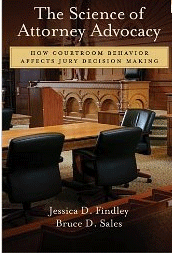“The Science of Attorney Advocacy: How Courtroom Behavior Affects Jury Decision Making”

“The Science of Attorney Advocacy: How Courtroom Behavior Affects Jury Decision Making”
By Jessica D. Findley and Bruce D. Sales
American Psychological Association
Washington, D.C., 2012
Book is exhaustive survey of attorney behavior
Reviewed by James K. Luiselli, Ed.D., ABPP, BCBA-D
Some books address fascinating topics, provide stimulating reading but target a select audience. Such is the case with this book which, in the authors’ words, “is primarily intended to familiarize researchers in psychology, communications, linguistics, and social sciences with the trial strategies being exposed by trial commentators,” namely attorneys, law professors and jury consultants. As it turns out, the book’s content covers a lot of psychological ground beyond the courtroom.
Jessica D. Findley and Bruce D. Sales advance the thesis that many lawyers are taught to rely on tactics that are often unsubstantiated or even contraindicated by the available scientific evidence. They contend that “When attorneys use advocacy techniques that are based on untested assumptions and intuition about human behavior, their clients’ interests may be jeopardized.” Accordingly, they wrote the book to correct this state of affairs among legal advocates.
Each chapter is an exhaustive survey of attorney behaviors, attitudes and practices. For example, the chapter about attorney demeanor considers attributes such as likability, honesty and credibility. The authors spend considerable time and exacting detail looking at the relevant research and relating it to legal proceedings. Other chapters analyze attorney verbal and paralinguistic communications, the attorney-client relationship and narrative aspects of attorney exposition.
To be expected, the authors examine juror perceptions of attorneys and the impact on verdicts. The book summarizes a vast literature, answering questions such as “do jurors judge the physical appearance of attorneys, how do they interpret verbal “legalese,” and what key motivators influence jury decisions?” As the book shows, the empirical evidence in this area is truly impressive and typically at odds with what we see in television dramas and movies!
I would add that even telecasts of real trials belie much of what Findley and Sales say in the book.
“The Science of Attorney Advocacy” is one of several books in the Law and Public Policy series published by the American Psychological Association. The series features the work of psychologists and other social scientists within the legal arena. Certainly, the book is geared toward attorneys and trial consultants from varied disciplines – they would do well to feature it prominently in their professional libraries.
Psychologists with a forensic specialty should also refer to the book because it will benefit them when deliberating with attorneys and preparing for courtroom testimony. On a more general level, reading the book would be a worthwhile pursuit for anyone interested in methods of social persuasion, information processing, group dynamics and communication science.
James K. Luiselli, Ed.D., ABPP, BCBA-D, is senior vice president, applied research, clinical training and peer review at the May Institute in Norwood, Mass.
Learn more about the book: The Science of Attorney Advocacy: How Courtroom Behavior Affects Jury Decision Making (Law and Public Policy: Psychology and the Social Sciences)
